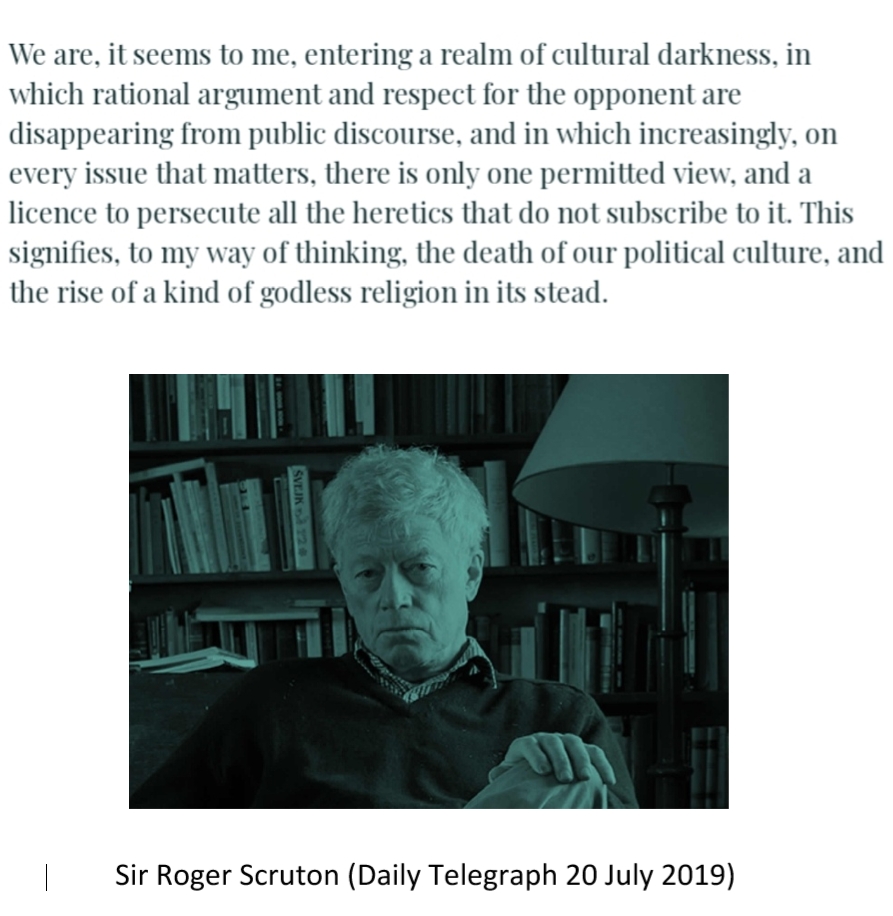

weren’t enough to give him a full understanding of this country’s deeply ingrained legacies of racism and cruelly regressive policies that intentionally keep the underprivileged in their place by stifling their ambitions and neglecting and abusing their living environments. It may be that the few years Scruton spent living in the U.S. That sounds very nice, but it takes no account of the systemic biases against the poor and minorities that in many parts of the world pose tremendous and unfair obstacles to taking meaningful responsibility. Conservatives’ job, he says, is to defend government against the failures and abuses of the Left, such as the “left-liberal belief that only the wealthy are accountable” while the poor and vulnerable are “inherently blameless” since they have, per his notion of left-wing philosophy, “not been ’empowered’ to be responsible.” He calls for a better form of government, one that “embodies all that we surrender to our neighbours, when we join with them as a nation.”



He acknowledges that small-scale human relations can’t manage large polities entirely, that governments are needed. He trains the wisdom of a lifetime of reflection on the visual arts – “Beauty tells you to stop thinking about yourself, and to wake up to the world of others” – and on cities, where “order emerges by an ‘invisible hand’ from the desire of people to get on with their neighbors.” In a deeply felt meditation on death and dying, he reflects that it’s our relations with others that give meaning to living: “The wholeness and fullness of our lives…has its origins in the judgement and affection of those whom we encounter.” Scruton applies this “relational idea” of the social construct to fields far beyond the dance floor. In his most nostalgic vein, he uses dance as an implied metaphor for society at large, lamenting the disappearance of traditional dances which were “social activit, in which we exalt and idealise our rational nature.” By contrast, the bodies of today’s young dancers, jerked into motion by DJs who use “pre-packaged computer sounds” to “manipulate the movements of the crowd…become sexual objects, voided of personality, since personality is a relational idea, and no relation exists on the dance floor except that between bodies.” Scruton is harsh on the errors of modern culture’s ways: modernist architecture and urban planning, abstract and conceptual art, pet fetishism, and even DJ-era dancing all feel the sting of his arrows. Nearly everyone may find something to disagree with in Confessions of a Heretic ( Notting Hill Editions, 2016) – which might more accurately have been titled Invective from a Grouchy Old Man with a Twinkle in His Eye – but its pages glow with admirable thinking, a crusty kind of likability, and welcome appeals to rationality. With intellectual force, a learned wit, and a bracing way with words, the English philosopher Roger Scruton trains his conservative philosophy on the arts, the environment, social media, and more pokes as he pokes at liberalism’s weaknesses in a new collection of essays.
#ROGER SCRUTON CONFESSIONS OF A HERETIC LICENSE#
Photo by Elekes Andor, licensed under the Creative Commons Attribution-Share Alike 4.0 International license Scruton attempts to find a remedy for the void at the heart of our civilisation and seeks to answer the pressing problems of our age: What can we do to protect Western values against Islamic extremism? Why is the Nation State worth preserving? Why do we turn immediately on all those who wish to defend our rooted values against whatever invading force has appeared over the horizon? How should we achieve a timely death against the advances of modern medicine? This diverse collection includes essays on art, music, architecture, government, social media, and culture.Īs Douglas Murray writes in his introduction, Scruton was an outsider, yet he showed his readers ‘not just what they should reject, but what they should nurture and love.’ This selection offers consolation and guidance to a new generation of readers.Roger Scruton lecturing in Budapest on “Europe and the Conservative Cause”, Centre for Humanities and Social Sciences. Each ‘confession’ reveals an aspect of the author’s thinking that his critics would probably have advised him to keep to himself. A collection of twelve provocative essays by the philosopher and political thinker Roger Scruton.


 0 kommentar(er)
0 kommentar(er)
